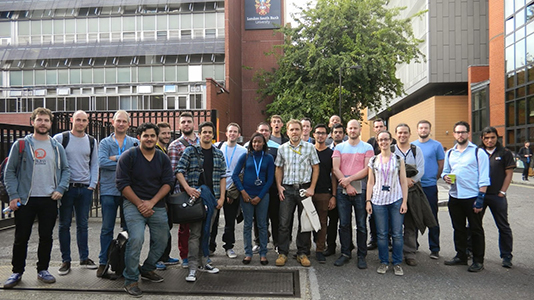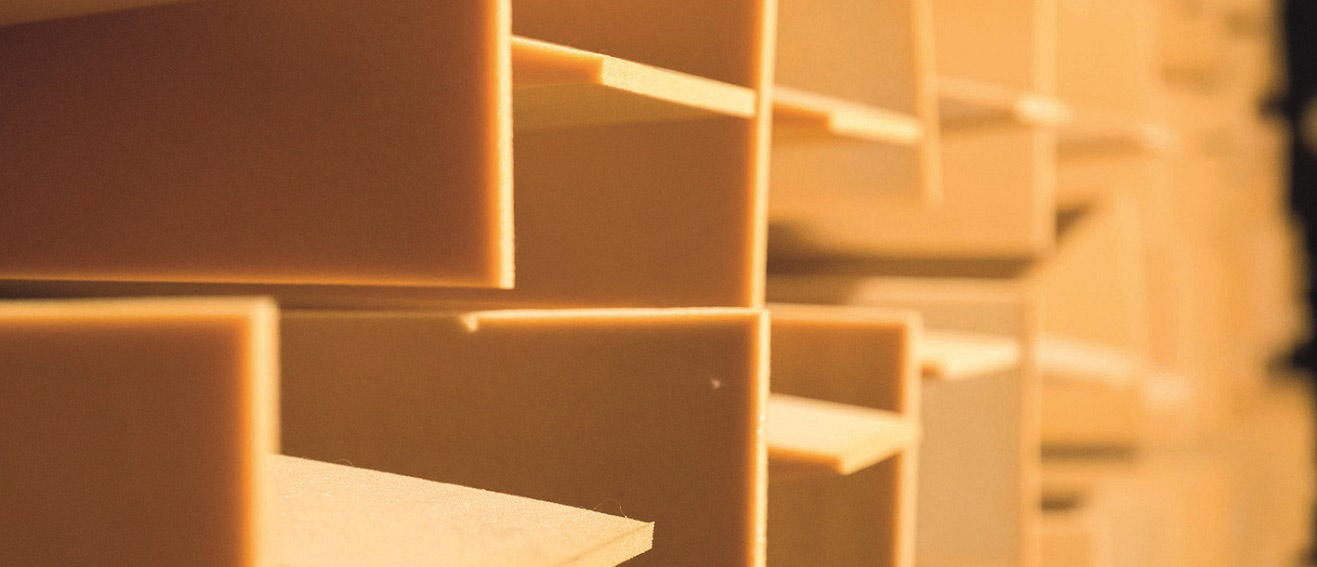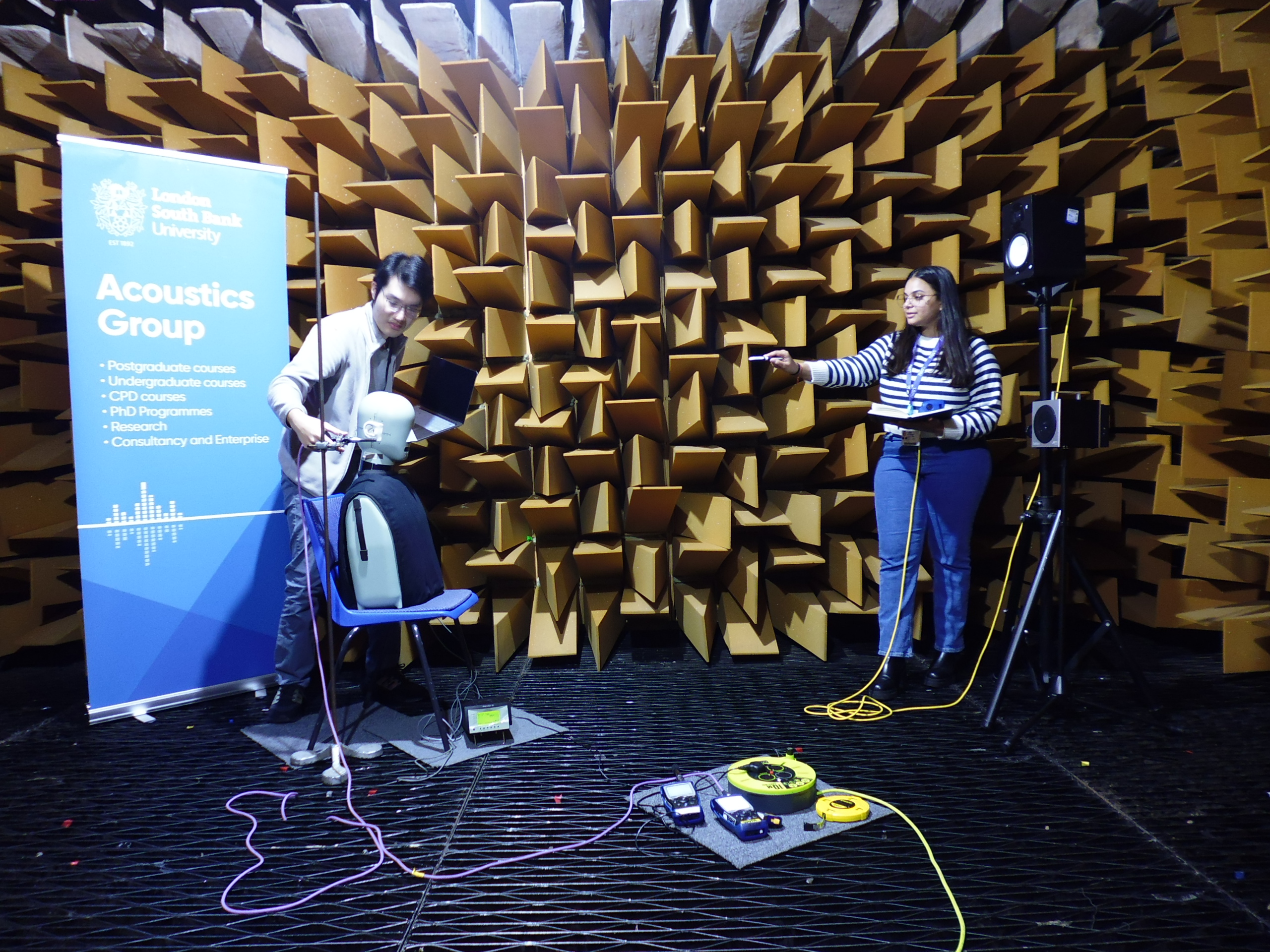Overview
High level training
The IOA Diploma in Acoustics and Noise Control is widely recognised as the educational qualification of choice for professional practitioners in acoustics, noise and vibration. It can secure you a career in related disciplines, including environmental health, mechanical engineering, building services engineering, architecture, urban planning, health and safety and the music industry.
The Diploma provides sufficient specialist academic training to satisfy the educational requirements for membership of the Institute of Acoustics, the most highly regarded professional membership in the acoustics, noise and vibration industry. The Diploma has been taught since 1975 and is well-known for providing a high level training in acoustics and noise control.
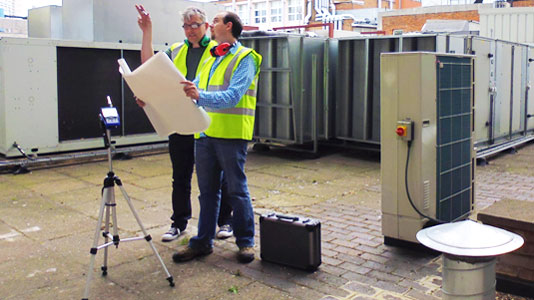
The course runs part-time (one day a week, Thursday) over one academic year (Sept-Oct). You'll have access to our extensive on-site and electronic library, as well as the Learning Resource Centre. We are the only provider of the IOA Diploma to offer fully face-to-face training.
Fantastic facilities
Our fantastic facilities include a full-size reverberant and anechoic chambers, as well as an exceptionally well equipped laboratory, featuring the very latest instrumentation and technology. To find out more, see the course content tab.
Why IOA Acoustics and Noise Control at LSBU?
- check-circle
- Offering courses in Acoustics for over 35 years, we house the only centre for study in the South-East with full-size reverberant and anechoic chambers as well as an exceptionally well-equipped and staffed laboratory.
- light bulb
- Our teaching team are award-winning. All are actively involved in research and consultancy, drawing on the latest industry developments in both lectures and practical work.
- level-up
- We showcase the high-quality output of our acoustic group on the LSBU Acoustic blog.
- rocket
- Successful completion of the IOA Diploma exempts you from five out of eight modules of the LSBU MSc Environmental and Architectural Acoustics.
| ModePart-time | Duration1 year | Start dateSeptember | Application code4341 | Application method Direct to LSBU |
Watch our video to see how you can make yourself at home studying at LSBU.
Location
London South Bank University student union is located at 103 Borough Rd, London SE1 0AA.
If you are visiting our Southwark Campus, you may wish to use our downloadable campus map (PNG File 466 KB). For information on accessibility, see our DisabledGo access guides. See our location page for more details.
Entry Level Requirements
Need further information? Call us on 0800 923 8888 to discuss entry requirements.
The standard entry requirement is a 2:2 or above degree (or the equivalent experience and achievement) in a science or branch of engineering, or in a cognate discipline such as construction, sonic arts or environmental health.
Although the IOA Diploma is committed to maintaining academic rigour, it is also committed to an open access policy. If you lack the standard entry level then a qualification in an alternative discipline or substantial relevant professional experience may be an acceptable alternative, as long as you can demonstrate an appropriate level of study skills and baseline knowledge, particularly in mathematics and physics.
The course is considered to be to a postgraduate level. You should seek the advice of the course director if you are seeking non-standard entry.
If English is not your first language you will be required to demonstrate an approved level of proficiency. The minimum requirements for this course are:
- IELTS minimum 6.5 overall with a minimum of 6.0 in each individual component
- TOEFL IBT minimum 80 with a minimum of 19 in each individual component
or equivalent
Choose your country
Select country here:
Missing English and Maths qualifications?
If you do not have the required English and Maths qualifications needed to satisfy the entry requirements for this programme, we have courses available at our partner College that you can take to upskill in these areas. Find out more at South Bank College.
United Kingdom
£6800
Tuition fees for home students
International
£9472.22
Tuition fees for international students
Tuition fees are subject to annual inflationary increases. Find out more about tuition fees for Undergraduate or Postgraduate courses.
-
Part-time
part-time
Institute of Acoustics Diploma (PT) - Year 1
UK fee: £6800 International fee: £9472.22 AOS/LSBU code: 4341 Session code: 1PS00
For more information, including how and when to pay, see our fees and funding section for postgraduate students.
See our Tuition Fees Regulations (PDF File 391 KB) and Refund Policy (PDF File 775 KB).
Possible fee changes
The University reserves the right to increase its fees in line with changes to legislation, regulation and any government guidance or decisions.
The fees for international students are reviewed annually and the University reserves the right to increase the tuition fees in line with the RPIX measure of inflation up to 4 per cent.
Postgraduate loan (PGL) for Masters study
If you are starting a Masters course, studying either full- or part-time, you may be entitled to apply for a postgraduate study loan. Find out more at our postgraduate fees and funding section.
Scholarships
We offer several types of fee reduction through our scholarships and bursaries. Find the full list and other useful information on funding your studies on the scholarships and fee discounts page.
Fee status
Please check your fee status and whether you are considered a Home, EU or International student for fee-paying purposes and for our regulatory returns, by reading the UKCISA regulations.
The total fee shown is inclusive of the IOA exam fees, LSBU fee, course materials and the official IOA course notes (worth £150).
The writing up fee:
A student can change to writing up status for the purpose of a lower fee when the examination arrangements have been submitted and approved. Examination arrangements are submitted 3 months prior to submission of the thesis for examination. A student only has one year of writing up at the reduced fee that covers submission, viva, and minor corrections. The writing up fee 25/26 is £1,246
Home and International entry
| Mode Part-time | Duration 1 year | Start date September | Application code 4341 | Application method Direct to LSBU |
Postgraduate students and research students should apply through our dedicated application system. Full details of how to do this are supplied on our How to apply section for postgraduate students and our How to apply section for research students.
See our admissions policy (PDF File 1,520 KB) and complaints policy (PDF File 516 KB).
Accommodation
Students should apply for accommodation at London South Bank University (LSBU) as soon as possible, once we have made an offer of a place on one of our academic courses. Read more about applying for accommodation at LSBU.
Finance
It's a good idea to think about how you'll pay university tuition and maintenance costs while you're still applying for a place to study. Remember – you don't need to wait for a confirmed place on a course to start applying for student finance. Read how to pay your fees as a postgraduate student.
Prepare to start
We help our students prepare for university even before the semester starts. To find out when you should apply for your LSBU accommodation or student finance read the How to apply tab for this course.
Enrolment
Before you start your course we’ll send you information on what you’ll need to do before you arrive and during your first few days on campus. You can read about the process on our Enrolment pages.
The following five modules are available at LSBU:
- General Principles of Acoustics (GPA)
- Laboratory
- Building Acoustics
- Noise and Vibration control
- Project
To complete the Diploma at LSBU you’ll need to take and pass the five modules we offer at LSBU. If you wish to take other modules than the ones we offer at LSBU, you’ll need to apply to take the Diploma via IOA distance learning option or apply to take it at centres where the modules of your interest are offered.
The GPA Module involves around 120 study hours including coursework and tutorials. Each Specialist Module is around 60 hours study time.
Successful completion of IOA Diploma exempts you from five out of eight modules of the LSBU MSc Environmental and Architectural Acoustics.
For further information, please read the IOA Diploma course syllabus.
Facilities
Our facilities include a full-size reverberation chamber, anechoic chambers, two audiometric booths and an exceptionally well equipped and staffed laboratory, with access to the very latest instrumentation and technology.
Our specialised lab equipment includes:
- B&K Shaker
- B&K accelerometers
- B&K head and Torso Simulator
- B&K calibrated sound source
- BSWA two channel Standing Wave/sound transmission Tube
- Microflown Impedance Gun
- 2 KayPentax Vocal Load APM
- Svantek 6 Channel Vibration Meter
- JBL 6112 Subwoofer
- 2 Dodec Loudspeakers
- 3 Norsonic Nor 140 Class 1 SLM
- 2 CEL 593 Class 1 SLM
- Svantek 958 Noise/Vibration meter
- Norsonic Nor 132 Class 2 SLM
- 6 NTI XL2 Class 1 SLM
- 10 SoundBadge Dosimeters
- Rion Vibration Suite
- B&K Standing Wave Tube
- Norsonic Sound Insulation Kit
Students work in the reverberation chamber
- B&K Shaker
- B&K accelerometers
- B&K head and Torso Simulator
- B&K calibrated sound source
- BSWA two channel Standing Wave/sound transmission Tube
- Microflown Impedance Gun
- 2 KayPentax Vocal Load APM
- Svantek 6 Channel Vibration Meter
- JBL 6112 Subwoofer
- 2 Dodec Loudspeakers
- 3 Norsonic Nor 140 Class 1 SLM
- 2 CEL 593 Class 1 SLM
- Svantek 958 Noise/Vibration meter
- Norsonic Nor 132 Class 2 SLM
- 6 NTI XL2 Class 1 SLM
- 10 SoundBadge Dosimeters
- Rion Vibration Suite
- B&K Standing Wave Tube
- Norsonic Sound Insulation Kit
Facilities
Our facilities include a full-size reverberation chamber, anechoic chambers, two audiometric booths and an exceptionally well equipped and staffed laboratory, with access to the very latest instrumentation and technology.
Our specialised lab equipment includes:
Students work in the reverberation chamber
Careers
Employability Service
At LSBU, we want to set you up for a successful career. During your studies – and for two years after you graduate – you’ll have access to our Employability Service, which includes:
- Free employability workshop and events for student all year round, more details can be found on our event section.
- Online board where you can see a wide range of placements: part-time, full-time or voluntary. You can also drop in to see our Job Shop advisers, who are always available to help you take the next step in your search.
- LSBU Careers Hub offering group workshops on CVs, interview techniques and support, guidance on future careers, as well as loads of career resources, connecting you with employers, exciting events, 1-1 support and relevant workshops.
Our Student Enterprise team can also help you start your own business and develop valuable entrepreneurial skills.
This course provides the training needed to satisfy the requirements for corporate membership of the Institute of Acoustics (IOA) and is recognised as a valid qualification towards achievement a Chartered Engineer status (CEng).
The Diploma is well regarded in other countries including the USA, Canada and Australia.
Graduates are particularly sought after in the acoustics, noise and vibration control related industries. Other industry sectors such as Architectural, Building Services Engineering, Sound Engineering, Health and Safety, Environmental Health and Civil Engineering seek this qualification for some of their employees and projects.
If there is a clear link between the number of job ads and growing economic prosperity, then it would appear that the acoustics sector is enjoying something of a boom.
Institute of Acoustics, March 2015
This course meets the educational requirements for membership of the Institute of Acoustics (IOA). Membership can provide you with contacts and networking opportunities, so it's a good platform on which to build your career.
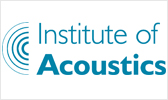
- The Institute of Acoustics (IoA) is a British professional engineering institution founded in 1974. It is licensed by the Engineering Council UK to assess candidates for inclusion on ECUK's Register of professional Engineers.
The department has extensive links with industry. This means students have the opportunity to go on site visits, receive guest lectures, take part in research initiatives, go to networking events and collaborate on projects with professionals working in the field.
Read more about the activities of our Acoustics group on our blog, featuring recent collaborations, research awards, master classes and projects.
Teaching makes extensive use of industry case studies, consultancy and research to demonstrate theory and best practice. Some of our industrial links include:
Teaching and Assessment
Students learn through a combination of tutorials, lectures, and off-site visits. The Laboratory module consists entirely of hands-on experiments, and the Project module is practical investigative work, conducted under the supervision of a tutor.
Members of the teaching team are all highly-experienced and award-winning lecturers. Senior IOA Diploma teacher Bob Peters is a member of the IOA education committee and author of book Acoustics and Noise Control (3rd edition), widely used by students studying the Diploma.
